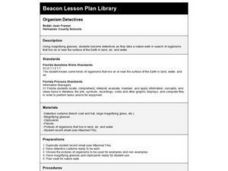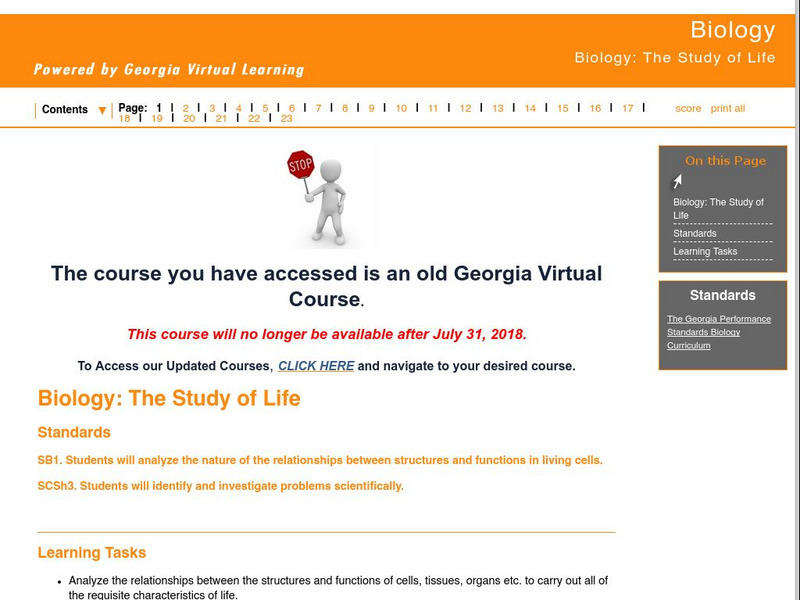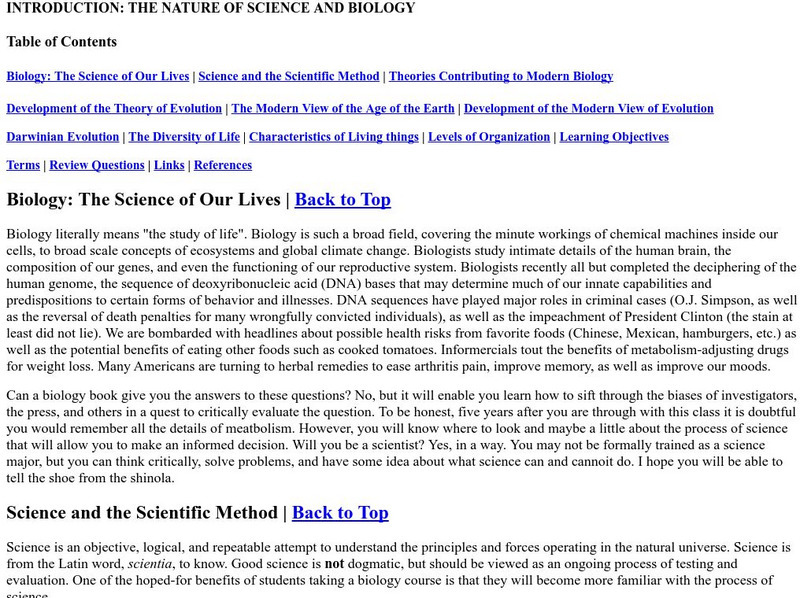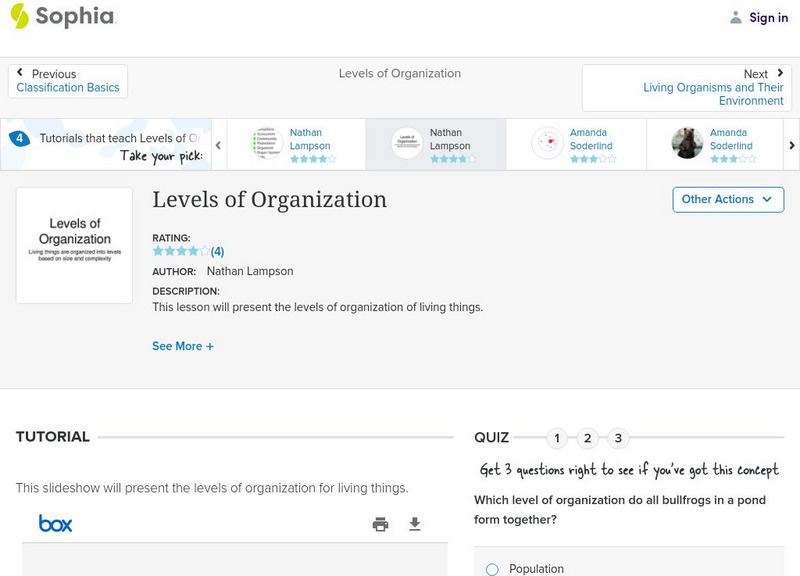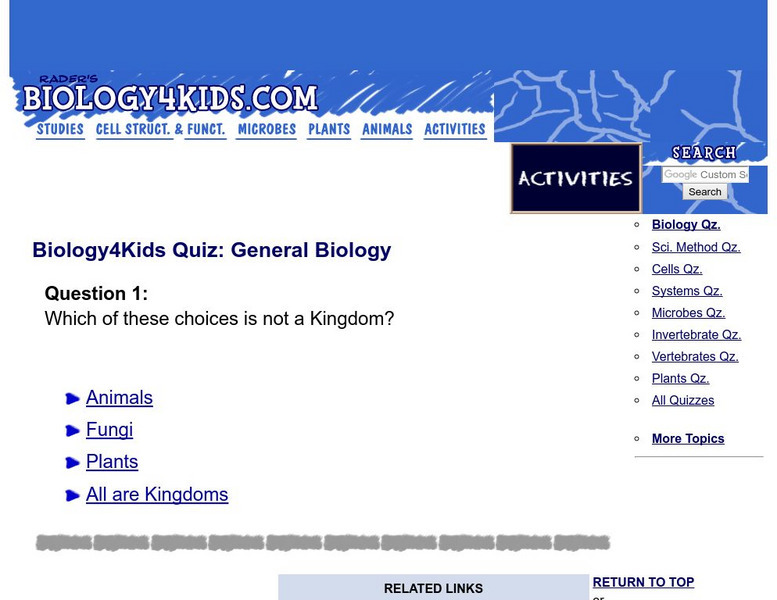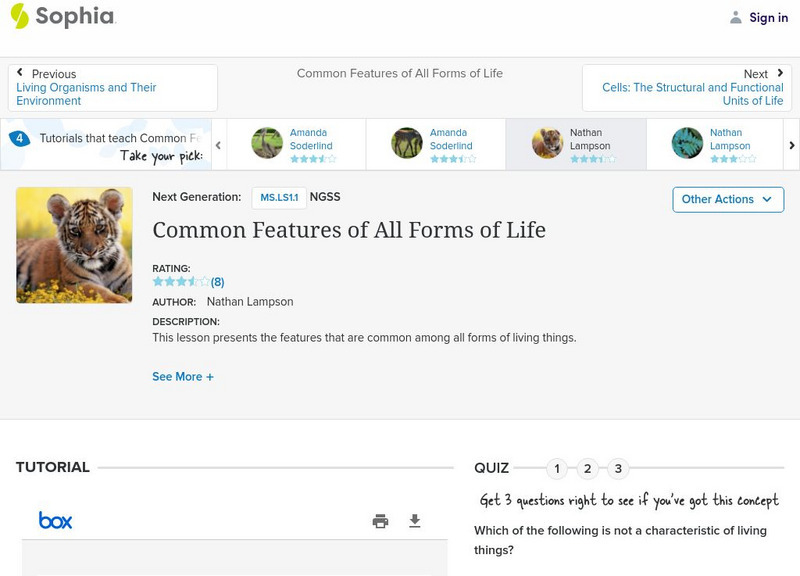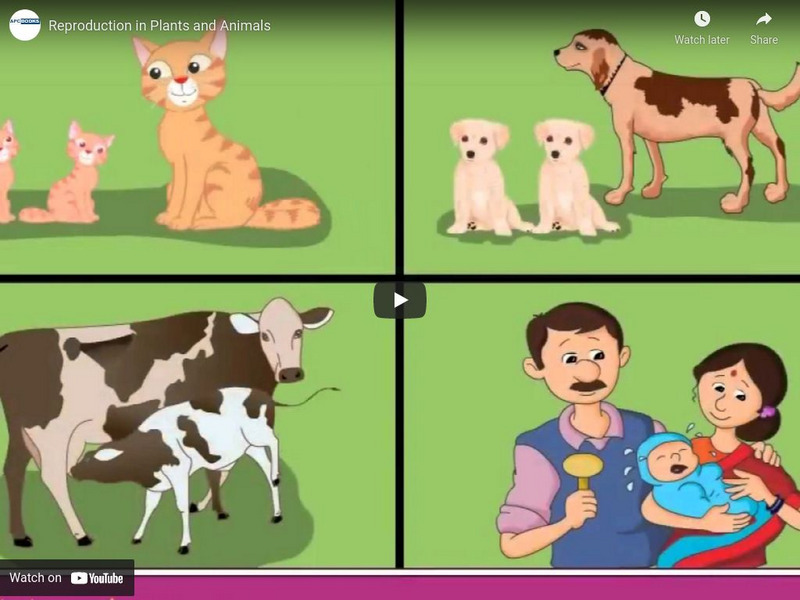Curated OER
Classification
Students work in groups of 4-6 for the experiment/activity part of this exercise. They classify ten animals using the information on the picture to group the animals. Students develop descriptions, explanations, predictions, and models...
Curated OER
The City From the Ooze
Students investigate the life in the mud found around ponds. They create Ooze City using pond mud. Students investigate the various layers that form and what type of organisms are in the mud.
Curated OER
Organism Detectives
First graders take a nature walk and search for organisms. They use magnifying glasses to see things that live on or near the surface of the Earth in land, air, and water.
Georgia Department of Education
Ga Virtual Learning: Biology: The Study of Life
A learning module where students analyze the relationships between the structures and functions of cells, tissues, organs to carry out all of the requisite characteristics of life. They also describe the scope of biological study and...
Encyclopedia of Earth
Encyclopedia of Earth: Evolutionary Biology: Organism
Article explaining what organisms are, their cellular foundation, and how they get their energy and nutrition. (Published: May 26, 2010)
Other
Science4 Us: Living/nonliving
Students explore the similarities and differences between living and nonliving things and learn four characteristics that all living things share (they have needs, they are made up of parts, they respond to change, they reproduce)....
Estrella Mountain Community College
Online Biology Book: The Nature of Science and Biology
Use the scientific reasoning and critical thinking to take an in-depth look at the basics of biology.
Other
My Science Box: Ecosystem Organization
In this lesson plan, students will learn about the different levels in the hierarchy of ecology and explain the relationships: organism, population, community, ecosystem, biome, and biosphere. They will also discover why different...
US Geological Survey
Mercury in the Geochemical Cycle
Mercury in the geochemical cycle ultimately affects the food chain. Learn about this and its effect on the Everglades.
McGraw Hill
Glencoe Biology: Modern Classification: Self Check Quiz
Try these five self-checking quiz questions over modern classification of living things. Click on the hints to see information about each question.
Sophia Learning
Sophia: Levels of Organization: Lesson 4
This lesson will present the levels of organization of living things. It is 4 of 6 in the series titled "Levels of Organization."
Biology 4 kids
Biology4 Kids: The Top Four Kingdoms
Read about the four most familiar kingdoms: fungi, plant, animal, and protist.
Biology 4 kids
Biology4 Kids: Quiz: General Biology
Take this ten-question, general biology review quiz. Read more about each question after an incorrect answer is given.
Sophia Learning
Sophia: 7 Characteristics of Life: Lesson 2
This lesson will introduce the 7 characteristics of all living things. It is 2 of 4 in the series titled "7 Characteristics of Life."
Famous Scientists
Famous Scientists: Carolus Linnaeus
Learn about the life and work of Carolus Linnaeus, the scientist who formalized the modern system of naming organisms called binomial nomenclature.
TeachEngineering
Teach Engineering: Compare Human Made Objects With Natural Objects
In small groups, students will experiment and observe the similarities and differences between human-made objects and nature. The students will compare the function and structure of hollow bones with drinking straws, bird beaks, tool...
Sophia Learning
Sophia: Common Features of All Forms of Life
This slide show describes the seven common characteristics of all living things.
Other
Reproduction in Plants and Animals
Reproduction in Plants and Animals. The ability to produce more organism similar to themselves is a very important characteristic of all living organisms. The process by which they do so is known as reproduction. [0:21]
BBC
Bbc: Gcse Bitesize: Mitosis and Cell Specialization
This lesson focuses on cell specialization. This cell must divide to produce a multi-cellular organism. It must also differentiate, so that its cells develop features that enable them to fulfil specific roles. Links are provided to a...
The Wonder of Science
The Wonder of Science: Ms Ls1 1: Cell Theory
Work samples, phenomena, assessment templates, and videos that directly address standard MS-LS1-1: cell theory.
Khan Academy
Khan Academy: What Is Ecology?
A webpage giving an overview of ecology. Learn about the biotic and abiotic factors that make up an ecosystem as well as the different levels of ecology.
CK-12 Foundation
Ck 12: Life Science: 3.18 Cloning
Understand the science and ethics behind human or animal cloning.
CK-12 Foundation
Ck 12: Life Science: 2.3 Cell Theory
Learn about the cell theory and levels of organization in a multicellular organism.
American Museum of Natural History
American Museum of Natural History: O Logy: The Tree of Life: True Bacteria
Visit the tree of life and discover characteristics, habitats, and examples of the world's true bacteria.




